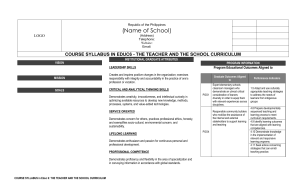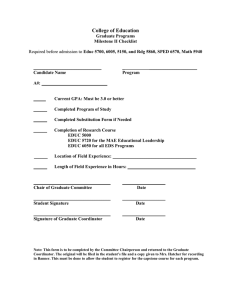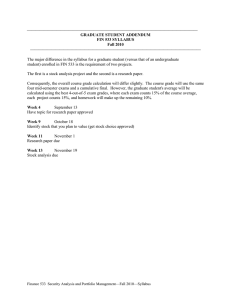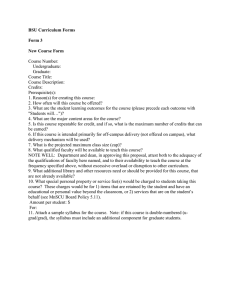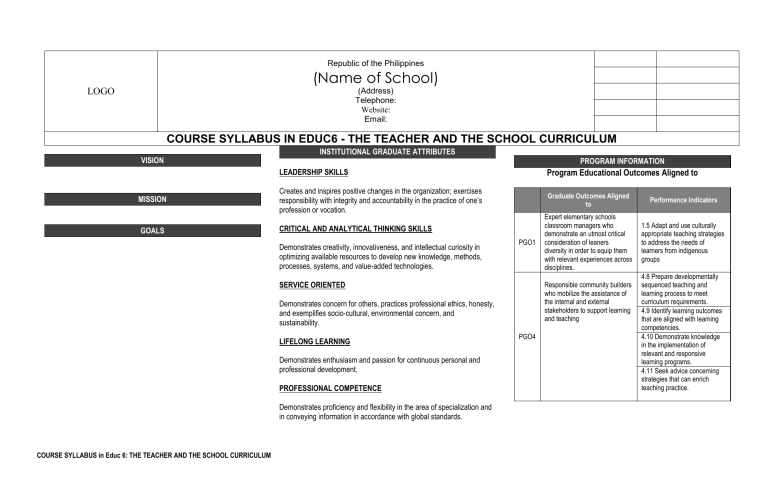
Republic of the Philippines (Name of School) LOGO (Address) Telephone: Website: Email: COURSE SYLLABUS IN EDUC6 - THE TEACHER AND THE SCHOOL CURRICULUM VISION INSTITUTIONAL GRADUATE ATTRIBUTES PROGRAM INFORMATION LEADERSHIP SKILLS Program Educational Outcomes Aligned to MISSION Creates and inspires positive changes in the organization; exercises responsibility with integrity and accountability in the practice of one’s profession or vocation. Graduate Outcomes Aligned to Performance Indicators GOALS CRITICAL AND ANALYTICAL THINKING SKILLS Expert elementary schools classroom managers who demonstrate an utmost critical consideration of leaners diversity in order to equip them with relevant experiences across disciplines. 1.5 Adapt and use culturally appropriate teaching strategies to address the needs of learners from indigenous groups Demonstrates creativity, innovativeness, and intellectual curiosity in optimizing available resources to develop new knowledge, methods, processes, systems, and value-added technologies. PGO1 SERVICE ORIENTED Responsible community builders who mobilize the assistance of the internal and external stakeholders to support learning and teaching Demonstrates concern for others, practices professional ethics, honesty, and exemplifies socio-cultural, environmental concern, and sustainability. LIFELONG LEARNING Demonstrates enthusiasm and passion for continuous personal and professional development. PROFESSIONAL COMPETENCE Demonstrates proficiency and flexibility in the area of specialization and in conveying information in accordance with global standards. COURSE SYLLABUS in Educ 6: THE TEACHER AND THE SCHOOL CURRICULUM PGO4 4.8 Prepare developmentally sequenced teaching and learning process to meet curriculum requirements. 4.9 Identify learning outcomes that are aligned with learning competencies. 4.10 Demonstrate knowledge in the implementation of relevant and responsive learning programs. 4.11 Seek advice concerning strategies that can enrich teaching practice. I. COURSE INFORMATION Course Code : Educ 6 Course Title : Teacher and the School Curriculum Pre-requisite : Credit : 3.0 units Level : 3rd year Semester/Year : 1st semester / 2020-2021 Version Number : 2.0 Course Description: Workload of Students: You are required to engage the activities of this course in a varied FLEXIBLE PLATFORMS AND MODALITY, and complete the course modules either in hard print or through accessing the USEP MVLE. The UVE or other virtual environments serve as alternative modality for students to interact with their peers and their instructor/professor. Faculty Information: Name: Email: Contact Number: Office: This course includes the fundamental concepts and principles in curriculum and curriculum development as a foundation to engage prospective teachers as curricularists. The more active role of the teachers in planning, implementing and evaluating school-curriculum as well as in managing school curriculum change vis-à-vis various context of teaching – learning and curricular reforms shall be given emphasis. COURSE SYLLABUS in Educ 6: THE TEACHER AND THE SCHOOL CURRICULUM Consultation Schedule: by appointment – may be arranged through: Official email FB messenger/class chat room UVE chat box Text or call II. COURSE OUTCOMES (CO): On the completion of the course, student is expected to be able to do the following: Course Outcomes CO1 CO2 CO3 CO4 III. Graduate Outcomes Aligned to Demonstrate skills in designing and developing constructively-aligned and GO1: Expert elementary schools classroom managers who demonstrate an utmost critical consideration developmentally-sequenced learning programs, experiences and instructional of learners diversity in order to equip them with relevant experiences across disciplines. processes consistent with curricular needs. Demonstrate skills in the selection and use of tools appropriate for monitoring, critiquing and assessing instructional plans; and seek advice concerning strategies that can enrich teaching practice. Demonstrate knowledge in implementing contextualized learning programs and/or instructional plans that are relevant and responsive to the needs of diverse learners. GO4: Responsible community builders who mobilize the assistance of the internal and external stakeholders to support learning and teaching. Demonstrate knowledge of teaching strategies that are inclusive of learners from indigenous groups. LEARNING EVIDENCES: As evidence of attaining the above learning outcomes, the student has to do and submit the following: Learning Evidence LE1 Academic Papers LE2 Lesson Plans LE3 Teaching Demonstrations LE4 Online Major Examination Description and other Details Course Outcomes it represents You are required to submit academic papers as module assessment (e.g. discussion paper, synthesis papers, etc.) which manifests the breadth of your knowledge on a certain topic/ concept. These papers should be written in accordance with the CO1, CO3, CO4 approved format and with proper referencing. You are required to write lesson plans suit to a given situation/context. CO1, CO2 You are required to implement your lesson plan in a simulated environment with video recording. You are required to submit CO 1, CO2 the video recording of the simulation. You are required to take an online Multiple Choice Test, which covers all the topics and periods discussed from week 1 to week 18. The test items require you to recall facts, , analyze situations and use your knowledge and understanding of curriculum and CO1, CO 2, CO3, CO4 curriculum development COURSE SYLLABUS in Educ 6: THE TEACHER AND THE SCHOOL CURRICULUM IV. MEASUREMENT SYSTEM: (RUBIRCS) OTHER REQUIREMENTS AND ASSESSMENT ACTIVITIES (AA) Aside from the final output, the student will be assessed at other times during the term by the following: AA1 AA2 Assessment Activity Description and other Details Lesson Deliverables Participation in Discussion Fora You are required to submit various lesson deliverables in the modules. You are required to participate in the discussion for a by posting discussion topic and commenting on posted topics by your classmates. To rate your participation, 100-0 rating will be used. V. Course Outcomes it represents CO1, CO2, CO3, CO4 CO1, CO2, CO3, CO4 GRADING SYSTEM: The final grade in this course will be composed of the following items and their weights in the final grade computation: Assessment Item AA1 AA2 LE1 LE2 LE3 LE4 Grade Source (Score or Rubric Grade) Passing Grade Passing Grade conditions: Percentage of Final Grade Rubric Score Rubric Rubric Rubric Score 10% 10% 15% 15% 15% 15% 100% 75% Students shall submit all the necessary outputs and take all examinations. In case of lacking output or examination, the grade of inc shall be given in accordance with the existing rules and regulations reflected in the student handbook. COURSE SYLLABUS in Educ 6: THE TEACHER AND THE SCHOOL CURRICULUM VI. LEARNING PLAN: In order to achieve the outcomes of this course, learners will go through this learning plan Intended Learning Outcomes (ILO) Discuss the rationale for taking this course Course Outcome Weeks Topics Week 1 The role of this course in the attainment of USeP VMGO, IGA, PEO and GO VMGO Institutional Graduate Attributes Program Educational Outcomes Graduate Outcomes The Assessment for Learning 2 course Establish the connection of this course to the attainment of the graduate outcomes, program educational outcomes, institutional graduate attributes and the VMGO of USeP Outline the assessment component of this course and identify the key knowledge and skills required for management of curriculum and instruction At the end of Unit I, pre-service teachers should be able to: a. define the major conceptions of curriculum; b. and analyze the nature of the curriculum. c. come up with a definition of curriculum Module 1: Nature of Curriculum Week 2 d. distinguish terms and concepts related to curriculum e. explain the nature and importance of curriculum in schools. COURSE SYLLABUS in Educ 6: THE TEACHER AND THE SCHOOL CURRICULUM Lesson 1: Definitions of Curriculum Lesson 2: Major Conceptions Teaching-Learning Activities (TLA) Discussion Assessment Activities Critiquing Activity: 9-box (definitions of curriculum) Analysis: Synthesis Writing on Own Description of Curriculum Abstraction: Input on Definitions of Curriculum Application: One paragraph synthesis paper on definition of curriculum Activity: Scavenger Hunt Analysis: Q and A Abstraction: Input on Major concepts on Curriculum Application: 3-2-1 papers Module Assessment Discussion paper on Nature and Importance of Curriculum to different stakeholders of the school (teachers, administrators, students and parents) Required Reading VMGO Institutional Graduate Attributes Program Educational Outcomes Graduate Outcomes Management of Curriculum and Instruction Learning Evidence At the of the pre-service k. end Identify themodule different2,models of teachers should be able to:and development curriculum planning l. Discuss the roles of the participants in a. each Compare model the four philosophical m.Cite foundations the curriculum of curriculum: planning perennialism, challenges facingessentialism, the Philippines progressivism andst century. education in this 21 reconstructionism. n. Explain the roles of the most important At the end of the module 2, pre-service b. sectors Explain in curriculum the influence planning of the four in the teachers should be able to: Philippines educational in K-12 philosophies programon o. Describe curriculum the goal-based model of a. Identify what influences people’s curriculum planning in theofPhilippines. c. Identify the application perception on educational purposes. p. b.Define behaviorist, the curriculum cognitivist, implementation constructivist Describe how educational q. Discuss and humanist the issues, principles. challenges philosophy of school is beingin d. curriculum Come up implementation with own description of developed. learning r. c.Examine models of curriculum Explain the significance of implementation considering aims, goals and objectives to the process of s. e. Demonstrate Examine knowledge society on the “why”, the curriculumhow design andinfluenced organization “how” curriculum and “what” of curriculum d. Identify the sources of educational f. evaluation. Describe aims. the relationship of society and curriculum. e. Discuss the different domains of t. Determine parameters to identify learning g. List the from legal innovations legs curriculum in the in the in f. change Determine how theofcontents curriculum. the Philippines curriculum are selected. Explain of these u. h. the the need for change and legalof g.Justify Discuss theinfluence different approaches legs to the curriculum in the innovations in the curriculum curriculum design v. h.LayPhilippines out strategy to change and Explain the vertical and horizontal innovate curriculum in the school. organizations of curriculum design. i. j. Map the common qualities of CD Write a comprehensive review of the following: Subject center, learner centered and problem centered CD. Module3:2 Curriculum Foundations of Lesson Week 3- Development Curriculum and Planning 4 Lesson 1: Philosophical Foundations of Curriculum Activity: Misconception Activity: Idea Bubbles Check Analysis: QDiscussion Analysis: and A Forum Abstraction: Abstraction: Concept Input (text) mapping Application: Application: From text to meaning Lesson Plan for teaching demonstration Module 3: Phases and Process Week 4- of Curriculum Development 8 Lesson 1: Curriculum Planning Lesson 2: Psychological Lesson Foundations Curriculum - 4:Elements of Curriculum Implementation Planning 1. Models of implementation 2. Change processes 3. Institutionalization Activity: Benchmark Questions Analysis: Discussion Forum Abstraction: Input Application: Activity: 9-box challenge! One – paragraph reflection(one paper Activity: definitionInitial of learning Venn Diagram per box) Analysis: Analysis: QQ and and AA, Discussion Abstraction: Forum Input Abstraction:Venn Input Diagram Application: Application: One-paragraph reflection paper Activity: Activity: KWL Complete the timeline Analysis: Analysis: QQ and and A/ A Discussion Abstraction: Input Forum Application: Short synthesis paper Abstraction: Input Application: Activity: Reading: Learning RA 10533 synthesis Activity: Analysis:What Q and doAyou on think? RA 10533 Abstraction: Input: Analysis: Q and A Summary of Activity: legal foundations of curriculum Abstraction: Input Analysis: Application: Application: Abstraction: Reflection Reflection: paper on “What and Application: How “K-12toand improve Me” (Identity the curriculum’ paper) Reversed 3-2-1 paper Lesson 5: 3: Historical Curriculum – Evaluation Sociological Foundations 1. Reasons for evaluation 2. Types of evaluation Week 9- 3. Lesson Evaluation 4: Legal models Foundations 10 Module 4:Curriculum Trend andDesign Issues Lesson 2: on Curriculum, Curriculum and Organization Development andin curriculum 1. Approaches Improvement designing Lesson 1: Curriculum 2. Types of curriculum design Improvement 3. Elements of designing COURSE SYLLABUS in Educ 6: THE TEACHER AND THE SCHOOL CURRICULUM 4. Components of curriculum 1. Levels of curriculum design improvement 1 – subject 2 – competencies 3 – lesson objectives in each competency Module Assessment Discussion paper reflecting the your own philosophy of teaching and learning and how Module does it affect your Assessment: “future” teaching practices/strategies. Teaching Demonstration (Video) -PST will be given a classroom / learning situation (e.g. online class, PE class, etc.) and will conduct teaching demonstration Module Assessment: Develop a lesson anchored to DepEd Competency using a research-based teaching strategy contextualized to a certain local community. w. demonstrate research-based knowledge on the different trends and issues on curriculum and curriculum development x. demonstrate knowledge of teaching strategies that are inclusive of learners from indigenous groups. 2. Approaches to curriculum improvement Lesson 2: Researches on Curriculum Development Lesson 3: Contextualization of the Curriculum (Indigenization and Localization) Activity: Research Reading Analysis: Q and A Abstraction: Input Application: Research Dissect on teaching strategy. Activity: Describe your Locality (How does it vary from other locality?) Analysis: Q and A Abstraction: Input Application: Strategy paper on Contextualization WEEK 16-17 - COMPLETION OF REQUIREMENTS WEEK 18 – Deadline of Module Deliverables VII. 1. 2. 3. 4. 5. 6. 7. 8. REFERENCES/ARTICLES TO READ: (Must be written in APA Format) Bilbao, P.P., Dayagbil, F.T., Corpuz, B.B. (2014). Curriculum development. Quezon: Lorimar Publishing, Inc.Beins. Bilbao, Purita P. (2008). Curriculum development. Manila: Lorimar Publishing Incorporated. Garcia, Dolores G. (2007). Designing curriculum. Manila: Rex Book Store. Palma, Jesus C. Curriculum development system. A handbook for school practitioners in basic education. Perna, Daniel; Davis, James (2000). Aligning standards and classroom success: classroom success. Arlington Heights, Ill. :Skylight Professional Development. _______. 2006.Curriculum Theory and Development. Faculty of Education. Selected readings. University of Southern Queensland.Toowoomba, Queensland, Australia. A Guide to Curriculum Development: Purposes, Practices, Procedures Retrieved from http://www.sde.ct.gov/sde/cwp/view.asp?A=2618&Q=321162/ Overview of the Curriculum Process. Retrieved from http://www.fao.org/docrep/009/ah650e/AH650E03.htm#TopOfPage COURSE SYLLABUS in Educ 6: THE TEACHER AND THE SCHOOL CURRICULUM VIII. CLASSROOM POLICIES: 1. Class attendance and participation. It is very essential for students to attend class activities on regular basis. Since the course will cover a broad range of topic, it is the students’ responsibility to look for the materials covered in this course whether or not it is found in the textbooks. In this way, students can participate in any form of discussion in the classroom. Participating in classroom discussion is strongly encouraged to help the students feel more comfortable with the learning materials while at the same time giving the class the benefit of each one’s ideas and perspective. In this way, the instructor will be able to determine what needs to be clarified and be able to teach more effectively. 2. Assignments and Tasks. Assignments and tasks will be given frequently throughout the semester after each lecture. It is the students’ responsibility to get a copy of the assignment tasks from the instructor. The assignment will depend on the topic discussed which should be submitted on the agreed date. It must be written based on the format agreed in the class. 3. Group work. Students are encouraged to work together specially in group requirements. Students may share ideas is doing assignments and other requirements provided that each student or group submit requirements that only reflect their original work or ideas. 4. Academic Honesty. All USePians are bound to follow the rules and regulations stipulated in the student handbook of the University and the College of Teacher Education and Technology. All University policies regarding academic honesty apply to this course. Must not submit a plagiarized copy or form of any assessment output 5. Use of Virtual Learning Environment and other platforms. You are expected to have sufficient computer literacy skills such as the use of email, facebook, search engines and VLE platforms. Prepared by: Reviewed by: COURSE SYLLABUS in Educ 6: THE TEACHER AND THE SCHOOL CURRICULUM Approved:
